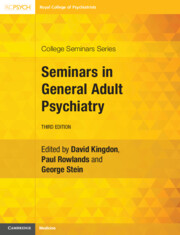Book contents
- Seminars in General Adult Psychiatry
- College Seminars Series
- Seminars in General Adult Psychiatry
- Copyright page
- Reviews
- Contents
- Contributors
- Introduction
- Chapter 1 Clinical Epidemiology
- Chapter 2 Assessment, Formulation and Diagnosis
- Chapter 3.1 Clinical Features of Depressive Disorders
- Chapter 3.2 Causes of Depression
- Chapter 3.3 Drug and Physical Treatments of Depression
- Chapter 3.4 Psychological and Social Treatment of Depression
- Chapter 4.1 Bipolar Disorder
- Chapter 4.2 Bipolar Disorder
- Chapter 5.1 Schizophrenia and Other Primary Psychoses
- Chapter 5.2 Causes and Outcome of Psychosis
- Chapter 5.3 Drug Treatment of the Psychoses
- Chapter 5.4 Psychosocial Management of Psychosis
- Chapter 6.1 Anxiety Disorders
- Chapter 6.2 Post-traumatic Stress Disorder
- Chapter 6.3 Specific Phobias
- Chapter 6.4 Obsessive-Compulsive and Related Disorders
- Chapter 6.5 Functional Neurological Disorder
- Chapter 6.6 Bodily Distress Disorder, Chronic Pain and Factitious Disorders
- Chapter 7.1 Clinical Features and Implications of New Classification of Personality Disorders
- Chapter 7.2 Clinical Approaches to Personality Disorder (AKA Complex Emotional Needs)
- Chapter 7.3 Antisocial and Other Personality Disorders, Impulse Control Disorders, and Non-substance Addictive Disorders
- Chapter 8 Neuropsychiatric Disorders
- Chapter 9 Autism
- Chapter 10 Attention-Deficit/Hyperactivity Disorder
- Chapter 11 Sleep Disorders and Psychiatry
- Chapter 12 Eating Disorders
- Chapter 13 Perinatal Psychiatry
- Chapter 14 Substance Use Disorders
- Chapter 15 Suicide and Self Harm
- Chapter 16 Physical Health Care
- Chapter 17 Culture, Mental Health and Mental Illnesses
- Chapter 18 Psychiatry in Primary Care
- Chapter 19 Psychiatry in the General Hospital
- Chapter 20 Adult Mental Health Services
- Index
- References
Chapter 6.1 - Anxiety Disorders
Published online by Cambridge University Press: 04 April 2024
- Seminars in General Adult Psychiatry
- College Seminars Series
- Seminars in General Adult Psychiatry
- Copyright page
- Reviews
- Contents
- Contributors
- Introduction
- Chapter 1 Clinical Epidemiology
- Chapter 2 Assessment, Formulation and Diagnosis
- Chapter 3.1 Clinical Features of Depressive Disorders
- Chapter 3.2 Causes of Depression
- Chapter 3.3 Drug and Physical Treatments of Depression
- Chapter 3.4 Psychological and Social Treatment of Depression
- Chapter 4.1 Bipolar Disorder
- Chapter 4.2 Bipolar Disorder
- Chapter 5.1 Schizophrenia and Other Primary Psychoses
- Chapter 5.2 Causes and Outcome of Psychosis
- Chapter 5.3 Drug Treatment of the Psychoses
- Chapter 5.4 Psychosocial Management of Psychosis
- Chapter 6.1 Anxiety Disorders
- Chapter 6.2 Post-traumatic Stress Disorder
- Chapter 6.3 Specific Phobias
- Chapter 6.4 Obsessive-Compulsive and Related Disorders
- Chapter 6.5 Functional Neurological Disorder
- Chapter 6.6 Bodily Distress Disorder, Chronic Pain and Factitious Disorders
- Chapter 7.1 Clinical Features and Implications of New Classification of Personality Disorders
- Chapter 7.2 Clinical Approaches to Personality Disorder (AKA Complex Emotional Needs)
- Chapter 7.3 Antisocial and Other Personality Disorders, Impulse Control Disorders, and Non-substance Addictive Disorders
- Chapter 8 Neuropsychiatric Disorders
- Chapter 9 Autism
- Chapter 10 Attention-Deficit/Hyperactivity Disorder
- Chapter 11 Sleep Disorders and Psychiatry
- Chapter 12 Eating Disorders
- Chapter 13 Perinatal Psychiatry
- Chapter 14 Substance Use Disorders
- Chapter 15 Suicide and Self Harm
- Chapter 16 Physical Health Care
- Chapter 17 Culture, Mental Health and Mental Illnesses
- Chapter 18 Psychiatry in Primary Care
- Chapter 19 Psychiatry in the General Hospital
- Chapter 20 Adult Mental Health Services
- Index
- References
Summary
Anxiety symptoms and anxiety disorders are common in community settings and primary and secondary medical care. Anxiety symptoms are often mild and only transient, but many people are troubled by severe symptoms that cause both considerable personal distress and a marked impairment in social and occupational function. The principal anxiety disorders are currently considered to comprise panic disorder, generalised anxiety disorder, social anxiety disorder, agoraphobia, specific phobias, separation anxiety disorder and selective mutism. Additional conditions (not considered further here) include substance/medication-induced anxiety disorder, anxiety disorder due to another medical condition, other specified anxiety disorder and unspecified anxiety disorder. Together, anxiety disorders constitute the most frequent mental disorders, with an estimated 12-month prevalence of approximately 10–14 per cent.
Although the societal impact of anxiety disorders is substantial, many of those who could benefit from psychological or pharmacological treatment are neither recognised nor treated. Recognition relies on maintaining a keen awareness of the psychological and physical symptoms of anxiety disorders, and accurate diagnosis rests on identifying the pathognomonic features of specific conditions.
Keywords
- Type
- Chapter
- Information
- Seminars in General Adult Psychiatry , pp. 293 - 313Publisher: Cambridge University PressPrint publication year: 2024
References
- 1
- Cited by

